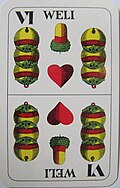User:Bermicourt/Card games/Schnellen
 The Weli, the permanent 2nd highest trump | |
| Origin | Germany |
|---|---|
| Alternative names | Schnelln, Schnölln |
| Type | Trick-taking |
| Family | Rams group |
| Players | 3–5 |
| Cards | 33 |
| Deck | German |
| Rank (high→low) | A K O U 10 9 8 7 |
| Related games | |
| Ramsen, Lampeln | |
| Features: 5 cards, no exchanging, Weli as special trump, game is 15, 21 or 25 points | |
Schnellen or Schnelln (dialect form: Schnölln) is an Austrian card game of the Rams group for 3 to 5 players. It is a variant of the Swiss game, Jass, and, together with Schnapsen, Bauernschnapsen, Bieten, Perlaggen and Watten, is one of the most popular games in the Austrian states of Tyrol and Vorarlberg.
N.B. According to Geiser, Schnellen is a Tyrolean version of Schnalzen played with 21 cards (Schnapsen pack plus Weli). N.B. Compare this and Schnalzen with Zwanzig Ab and Bohemian Watten.
Aim
[edit]The aim of Schnellen is to win tricks in order to be the first to get one's score down to zero.
Cards
[edit]| Acorns (Eichel) | Leaves (Laab) | Hearts (Herz) | Bells (Schell) |
|---|---|---|---|
Schnellen is played with a Salzburg pattern pack of German-suited cards, a regional form of the Bavarian pattern pack. The game uses 33 cards: the Sow (Deuce or Ace) to Seven in each of the four suits plus the ![]() 6, the Weli, which is always the second-highest trump card after the Trump Sow.
6, the Weli, which is always the second-highest trump card after the Trump Sow.
Playing
[edit]Schnellen may be played by 3 to 5 players.
Dealing
[edit]The dealer deals a packet of 3 cards to each player in turn, turns the next face up for himself and then deals another packet of 2 cards to each player. Thus the dealer ends up with 6 cards and the other players, 5 each. The upcard determines the trump suit and the dealer discards another card in its place.
Stepping out
[edit]Beginning with forehand, each player, in clockwise order, now elects to either to 'play' or to 'step out' (aussteigen) of the current deal. The dealer may not step out; other players may do so if they have more than 5 points left, in which case only 1 plus point is added to their score. One player must stay in the game; if all pass, rearhand plays with the dealer.
Trick-taking and scoring
[edit]Each player is given a set number of points at the beginning (often 15, 21 or 25), which he must reduce as quickly as possible. Each trick taken counts as one point off the score. If a player fails to take any tricks during a hand, he 'springs' or 'flips' (schnellt, hence the name of the game) 5 points higher. The winner is the first player to reach zero points first.
Variants
[edit]As with many traditional card games, there are numerous variants of Schnelln:
- Trick Bidding. Players bid, in clockwise order beginning with forehand, on the number of tricks they will win. The highest bidder wins the auction and chooses trumps. If he fails to reach his announced number of tricks, he 'springs' up 5 points. Players must outbid any previously announced bids or "pass". Only the dealer may outbid the highest bidder with an equal bid. The winner of the auction may also opt to play with no trump suit by saying "I'll play high" ("Ich spiele hoch.") Then the Weli is the highest card in play. If no-one bids more than 2 tricks, players may opt to redeal. The points in the next deal then count double or, if Hearts are trumps, quadruple.
- Force. Under certain circumstances, no player may opt to "pass". Typically this happens if the upcard is a Seven or an Acorn. In addition, the normal rule is that players with 5 points or fewer may not pass.
- Hearts Count Double. If the trump suit is Hearts, all points are doubled. Every trick is then worth 2 minus points. If a player 'springs', he jumps up 10 plus points.
- Exchanging. If a trump suit is called, up to 3 of the remaining cards may be exchanged. Four cards may not be exchanged, unless the trump Ace is shown. If all five cards are exchanged, the player receives 6 cards but may not lead to the first trick. The highest bidder begins, then exchanging proceeds clockwise. With five players it may happen that the last one only has a limited number of cards he may exchange with.
- Follow Suit Priority. Often the basic rule is that following suit (Farbzwang) takes priority over the compulsion to head the trick (Stechzwang). That means that each player must follow the led suit. If he has a higher card of the same suit, he must play it. If he only has a lower one, he must play that. Only if he doesn't have a card of the led suit in his hand, may he trump it and head the trick if he can in so doing.
Literature
[edit]- Bachmann, Dölf and Vene Maier (1988). Jassen. Die schönsten Varianten. Deuticke. ISBN 3852231132
- McLeod, John (April–June 2005). "Playing the Game: Schnellen, Hucklebuck & Donut". The Playing-Card. Journal of the International Playing Card Society. 33 (4): 288–292.
